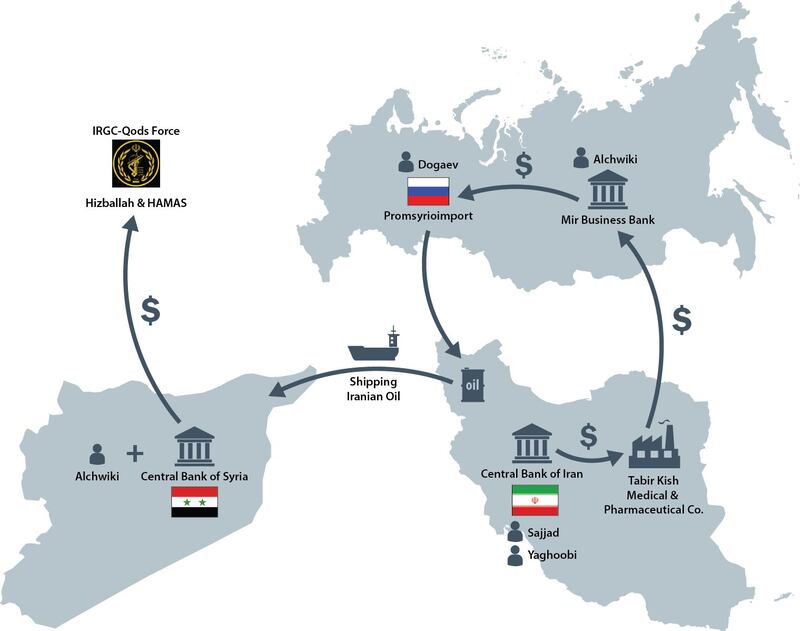Moscow and Tehran accused Washington on Wednesday of seeking to hamper reconstruction efforts in war-torn Syria, following the announcement of new sanctions targeting Russian companies and Syrian intermediaries which allegedly sent millions of barrels of oil to Syria.
On Tuesday, the US Treasury accused Russia of facilitating the shipment of Iranian oil to Syria, alleging that a Syrian citizen used his Russia-based company to ship Iranian oil to Syria with the aid of a Russian state-owned company.
The announcement of sanctions comes less than a month after the director of Syria’s state-owned petroleum company said that the oil ministry has a direct credit line with Iran, which provides millions of barrels of oil to Syria every month.
The Russian-Iranian network identified by the Treasury on Tuesday reveals one of the ways "Russia and Iran cooperate tactically for the sake of the survival of the Assad regime," Anton Mardasov, an expert at the Russian International Affairs Council (RIAC), told The National.
The new sanctions also underscore how Russia and Iran are coming under increasing pressure from US officials, who are seeking to curb Iranian influence in the region and undermine Russia on the global stage.
Those targeted by Tuesday’s sanctions include Syrian Mohammad Amer Alchwiki and his Russia-based company Global Vision Group, which were central to the delivery of Iranian oil to Syria and the transfer of funds to the Islamic Revolutionary Guard Corps' Quds Force's "lethal proxies", the Treasury Department said.
Others sanctioned include state-owned Russian company Promsyrioimport, a subsidiary of the Russian Energy Ministry, which the US Treasury alleges facilitated shipments of Iranian oil to Syria, as well as Mir Business Bank and Iran-based Tadbir Kish Medical and Pharmaceutical Company.
Other targets include Syrian national Hajji Abd Al Nasir, Lebanese national Muhammad Qasim Al Bazzal and Russian national Andrey Dogaev, as well as Iranian nationals Rasoul Sajjad and Hossein Yaghoubi Miab. Messrs Sajjad and Yaghoubi, both officials at the Central Bank of Iran, worked to facilitate Mr Alchwiki's transfers, the Treasury said.
Secretary of State Mike Pompeo warned on Twitter that there were "grave consequences for anyone shipping oil to Syria, or trying to evade US sanctions on the Islamic Republic's terrorist activities."
Today’s @USTreasury action targeting the Russia-Iran oil scheme to prop up Assad, and finance Hizballah & Hamas, sends a clear message: there are grave consequences for anyone shipping oil to Syria, or trying to evade U.S. sanctions on the Islamic Republic’s terrorist activities.
— Secretary Pompeo (@SecPompeo) November 20, 2018
The Russian foreign ministry responded on Wednesday saying the move only served to harm attempts to defeat “terrorists” in Syria, describing the step as a “clumsy” decision.
"Accusations concerning oil supplies to Syria – a country whose armed forces have been fighting terrorist aggression for over seven years – look like a statement of support for terrorists and also show a desire to prevent the reconstruction of the war-torn country, where many people live without electricity and heating. Is it what the United States really wants?" the Russian ministry asked.
Earlier in October, the director of Syria’s state-run oil company, Moustafa Haswiya, said that Syria’s current oil production of 23,000 barrels of oil per day was only enough to cover 10 per cent of market demand, with some of the deficit imported from Iran. He said at least two shipments arrived monthly, carrying a total of 2 million barrels of oil.
Russia will continue supplying oil to Syria in line with its agreement with Damascus despite pressure from the United States, RIA news agency quoted Oleg Morozov, a member of the Russian Federation Council, as saying late on Tuesday.
"The political defeat in Syria apparently prompts the United States to return to the idea of regime change in Damascus. Therefore, economic pressure through oil supply shutdown becomes a tool of the new economic war with [Syrian President] Bashar Al Assad and indirectly with Moscow and Iran," he said.
Mr Morozov said Russia acts with "absolutely legally".
"We have an agreement with Syria and therefore it's up to us to decide what we supply and to whom. This will be our answer, [it is] much more effective than counter-sanctions," he added.
An Iranian Foreign Ministry spokesman called the sanctions "fruitless, illogical and inefficient".
"Those who designed and implemented these sanctions will understand sooner or later that they will not achieve their goals,” Bahram Qasemi was quoted as saying by state news agency IRNA on Wednesday.
Syria’s oil ministry and state-run petroleum company were not immediately available for comment.
Earlier in September, the US Treasury said it was imposing sanctions on four people and five entities it said facilitated petroleum shipments and financing to the Syrian government. In June, the US charged five Russians and three Syrians with breaking US sanctions by sending jet fuel to Syria and with money laundering by making money transfers through the US financial system to pay for the fuel deliveries.





